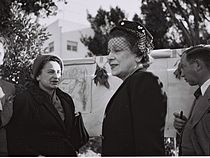Women's International Zionist Organization
| Template:Hebrew | |
 | |
| Formation | London, 7 June 1920 |
|---|---|
| Founder | Vera Weizmann Rivka Ziv Edit Edgar |
| Type | INGO |
| Purpose | Political advocacy |
President | Ester Mor |
| Website | wizo |
The Women's International Zionist Organization (WIZO; Template:Lang-he Vitzo), is a volunteer organization dedicated to social welfare in all sectors of Israeli society, the advancement of the status of women, and Jewish education in Israel and the Diaspora.
History

WIZO was founded in England on 7 July 1920 by Rebecca Sieff, Dr. Vera Weizmann (wife of Israel's first president, Dr. Chaim Weizmann), Edith Eder, Romana Goodman and Henrietta Irwell to provide community services for the residents of Mandate Palestine.
WIZO branches opened across Europe, such as that run by Julia Batino in Macedonia, but many were closed down in the wake of Nazi occupation and the Holocaust. Branches in Latin America continued to operate during the war.
In 1949, after the establishment of the State of Israel, WIZO moved its headquarters to Israel and Sieff became president of the world WIZO organization. In 1966, she was replaced by Rosa Ginossar. Other past presidents include Raya Jaglom and Michal Har'el Modai, former Miss Israel and wife of Israeli politician Yitzhak Moda'i.
Among WIZO's early social welfare projects in Mandatory Palestine were the establishment of Tipat Halav well-baby clinics and clothing distribution centers, many still in operation today.[1] WIZO opened the country's first day care center in Tel Aviv in 1926.
In 2008, WIZO, together with two other Women's organizations, received the Israel Prize for its lifetime achievements and special contribution to society and the State of Israel.[2][3]
Political activity in Israel
WIZO formed a party and ran for Knesset in Israel's first elections in 1949, receiving 1.2% of the vote. It won one seat and was represented by Rachel Cohen-Kagan, chairwoman of WIZO at the time. Cohen-Kagan later ran in the fifth Knesset as a member of the Liberal Party (though she was a member of the group that broke away to form the Independent Liberals).[4]
Today

Today, WIZO runs 180 day care centers in Israel,[5] caring for 14,000 children of working mothers, new immigrants and needy families. The organization also runs summer camps, courses for single-parent families and therapeutic frameworks for children removed from their homes by court order.[6]
WIZO is now the largest women's Zionist organization in the world. In 2008, 36 member countries sent delegates to Israel to celebrate the organization's 88th birthday.[7]
The current World WIZO president is Ester Mor, who replaced Tova Ben-Dov,[5] in 2016.[8]
See also
References
- ^ "The First Decade: 1920-1930". WIZO. Retrieved 10 August 2014.
- ^ "Israel Prize Official Site (in Hebrew) - Recipients' C.V.'s". Archived from the original on 4 May 2009.
{{cite web}}: Unknown parameter|deadurl=ignored (|url-status=suggested) (help) - ^ "Israel Prize Official Site (in Hebrew) - Judges' Rationale for Grant to Recipients". Archived from the original on 4 May 2009.
{{cite web}}: Unknown parameter|deadurl=ignored (|url-status=suggested) (help) - ^ "Knesset Member, Rachel Cohen-Kagan". knesset.gov.il.
{{cite web}}: Cite has empty unknown parameter:|dead-url=(help) - ^ a b Hila Weisberg (30 April 2012). "WIZO head: State plans for daycare are insufficient". Haaretz. Retrieved 10 August 2014.
- ^ Ingrid Rockberger (23 March 2007). "Supporting women and children". Haaretz. Retrieved 10 August 2014.
- ^ Aimee Neistat (21 January 2008). "WIZO: Responsibility, not charity". The Jerusalem Post. Retrieved 25 June 2015.
- ^ Ruth Sinai (14 January 2008). "Pioneers, mothers and teachers aiding the needy". Haaretz. Retrieved 10 August 2014.
{{cite news}}: Cite has empty unknown parameter:|1=(help)
External links
- Jewish organizations
- Organizations established in 1920
- Women's organizations based in Israel
- Israel Prize recipients that are organizations
- Israel Prize for lifetime achievement & special contribution to society recipients
- Women's rights organizations
- Defunct political parties in Israel
- International women's organizations
